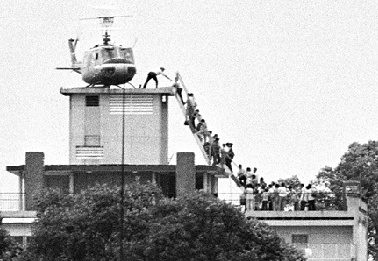Once again. panic-stricken Americans are trying to get out a country as enemy soldiers get closer and closer, with the U.S. Embassy madly shredding documents and smashing equipment before our few remaining military forces escort them to safety.
History is repeating itself as the Fall of Saigon is being replicated in the Fall of Kabul. After 20 years of heroic sacrifice on the part of our military men and women, the U. S. government is abandoning Afghanistan to the Taliban.
We did not learn what were identified decades ago as “the lessons of Viet Nam”: Don’t start a war unless you know what its end point would look like. Don’t start a war unless you are willing to commit to overwhelming force that would lead to victory. I would add these: Don’t start a war as an act of nation building. Don’t start a war to impose democracy and freedom on societies that lack the culture for them.
It’s easy to say in retrospect that we should never have gotten involved militarily against Afghanistan and Iraq. We can see now that those invasions were America’s desire to strike back at Islamist extremists after the terrorist attacks of 9/11. That was a mistake, particularly since the Taliban in Afghanistan and Saddam Hussein’s regime in Iraq had no direct tie to those attacks. But we found pretexts, first in defensive terms–Saddam is building weapons of mass destruction–and then in idealistic terms: We would free the people of Afghanistan and Iraq by defeating their oppressive rulers and giving them an American-style liberal democracy!
However wrong we were to be there, though, our exit is humiliating and dishonorable. Lots of Afghans did come to believe in democracy and freedom, helping us as translators, political leaders, and soldiers. Our pullout is abandoning them to be slaughtered.
Our forces have pulled back combat operations for years, but the presence of at least a few American troops and advisors were enough to keep the country somewhat stable. President Trump called for the remaining troops to come home. President Biden carried out that policy, while expressing confidence that the Afghani troops we have trained and supplied for decades at great expense would be sufficient to fend off the Taliban radicals. But, no, the Afghan army collapsed in a matter of weeks.
This analysis in the Wall Street Journal is instructive: How the Taliban Overran the Afghan Army, Built by the U.S. Over 20 Years. It observes that the Afghan Army was trained–at the expense of $100 billion–to fight alongside Americans, using U.S. tactics. The American military works with close coordination between ground forces and air operations, which bomb enemy positions and keep the troops well-supplied. Well, take away American air support, other sophisticated military technology, and American leadership and the Afghan soldiers did not know what to do.
Compounding the problem is that the U.S. sponsored Afghan government dispersed its 350,000-man army throughout the country in some 200 outposts. This was supposed to project strength in all of the districts of Afghanistan. But those outposts were often in remote locations that could only be supplied by air. When the planes stopped coming, the garrisons became short of food and ammunition. And their small numbers were easily overwhelmed by the Taliban, whose tactic was to massacre soldiers in one area, then announce to the next garrison that the soldiers could stay and be killed, or, alternatively, that they could leave their weapons and run away. Most of the soldiers ran.
Another reason they ran is that, unlike the Taliban, they didn’t know what they were fighting for. So says another report on the debacle:
Carter Malkasian, a longtime adviser to U.S. commanders in Afghanistan, has pegged the weakness of the Afghan forces on their lack of a unifying cause that resonates with Afghans, as well as their heavy dependence on the United States. By contrast, Taliban members were fighting for their culture and Islam. They “exemplified something that inspired, something that made them powerful in battle, something closely tied to what it meant to be an Afghan,” Malkasian writes in his new book, “The American War in Afghanistan.”
Which raises another issue for us Americans. Can we–as a nation polarized and disunited, our history discredited, disillusioned with our ideals–stand up to the zeal of Islamic radicals or to the confident assertiveness of Chinese Communism?
I think our rank and file military men and women do believe in American ideals, but I’m not sure about the politicians who send them to their deaths or the general public whose support or lack of support is crucial to their longterm success.
Of course, the 800,000 veterans of the Afghan War, which cost over $1 trillion and 2,400 lives, the capitulation to the enemy hurts deeply. In the words of a headline to a story on the subject, For many U.S. veterans, fall of Afghanistan to Taliban stirs confusion, disappointment and anger.
Once the Taliban consolidate their hold on Afghanistan, we will have the aftermath. First, a bloodbath to exterminate supporters of the Americans. Then the imposition of Islamic Law, construed in its harshest terms. The Biden administration trumpets its support of the rights of women and gays, but in turning the country over to the Taliban, women will be subject to sex slavery, they will no longer be allowed to get an education, and they will be subjected to one restriction after another. The Taliban’s policy towards homosexuals is summary execution. Afghani Christians can now expect the worst. Afghanis got a taste of Western freedom and democracy, but those will be no more.













